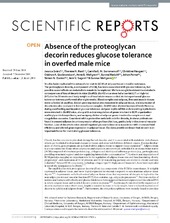| dc.contributor.author | Svärd, Jessica | en_US |
| dc.contributor.author | Røst, Therese Halvorsen | en_US |
| dc.contributor.author | Sommervoll, Camilla Elise Nergård | en_US |
| dc.contributor.author | Haugen, Christine | en_US |
| dc.contributor.author | Gudbrandsen, Oddrun Anita | en_US |
| dc.contributor.author | Christensen, Anne Elisabeth | en_US |
| dc.contributor.author | Rødahl, Eyvind | en_US |
| dc.contributor.author | Fernø, Johan | en_US |
| dc.contributor.author | Dankel, Simon N | en_US |
| dc.contributor.author | Sagen, Jørn V. | en_US |
| dc.contributor.author | Mellgren, Gunnar | en_US |
| dc.date.accessioned | 2020-03-19T13:59:50Z | |
| dc.date.available | 2020-03-19T13:59:50Z | |
| dc.date.issued | 2019 | |
| dc.Published | Svärd J, Røst TH, Sommervoll CE, Haugen C, Gudbrandsen OA, Christensen AE, Rødahl E, Fernø J, Dankel SND, Sagen JV, Mellgren G. Absence of the proteoglycan decorin reduces glucose tolerance in overfed male mice. Scientific Reports. 2019;9(1):4614 | eng |
| dc.identifier.issn | 2045-2322 | |
| dc.identifier.uri | https://hdl.handle.net/1956/21541 | |
| dc.description.abstract | Studies have implicated the extracellular matrix (ECM) of adipose tissue in insulin resistance. The proteoglycan decorin, a component of ECM, has been associated with glucose tolerance, but possible causal effects on metabolism remain to be explored. We here sought to determine metabolic consequences of loss of decorin in mice (DcnKO). DcnKO mice were fed a low-fat (LF) or high-fat (HF) diet for 10 weeks and body weight and food intake was recorded. An intraperitoneal glucose tolerance test was performed after eight weeks. Blood samples and adipose, liver and muscle tissues were collected at sacrifice. Global gene expression was measured in adipose tissue, and expression of decorin was also analyzed in human adipose samples. DcnKO mice showed increased feed efficiency during overfeeding and impaired glucose tolerance. Adipose leptin mRNA and circulating leptin levels were elevated in DcnKO mice, along with a downregulation of genes involved in ECM organization and triglyceride biosynthesis, and an upregulation of adipose genes involved in complement and coagulation cascades. Consistent with a protective metabolic role for decorin, in obese patients we found increased adipose decorin expression after profound fat loss, particularly in the stromal vascular fraction. Loss of decorin in mice caused impaired glucose tolerance in association with increased feed efficiency and altered gene expression in adipose tissue. Our data provide evidence that decorin is an important factor for maintaining glucose tolerance. | en_US |
| dc.language.iso | eng | eng |
| dc.publisher | Nature | eng |
| dc.rights | Attribution CC BY | eng |
| dc.rights.uri | http://creativecommons.org/licenses/by/4.0 | eng |
| dc.title | Absence of the proteoglycan decorin reduces glucose tolerance in overfed male mice | en_US |
| dc.type | Peer reviewed | |
| dc.type | Journal article | |
| dc.date.updated | 2019-12-13T12:06:51Z | |
| dc.description.version | publishedVersion | en_US |
| dc.rights.holder | Copyright 2019 The Author(s) | |
| dc.identifier.doi | https://doi.org/10.1038/s41598-018-37501-x | |
| dc.identifier.cristin | 1714242 | |
| dc.source.journal | Scientific Reports | |

